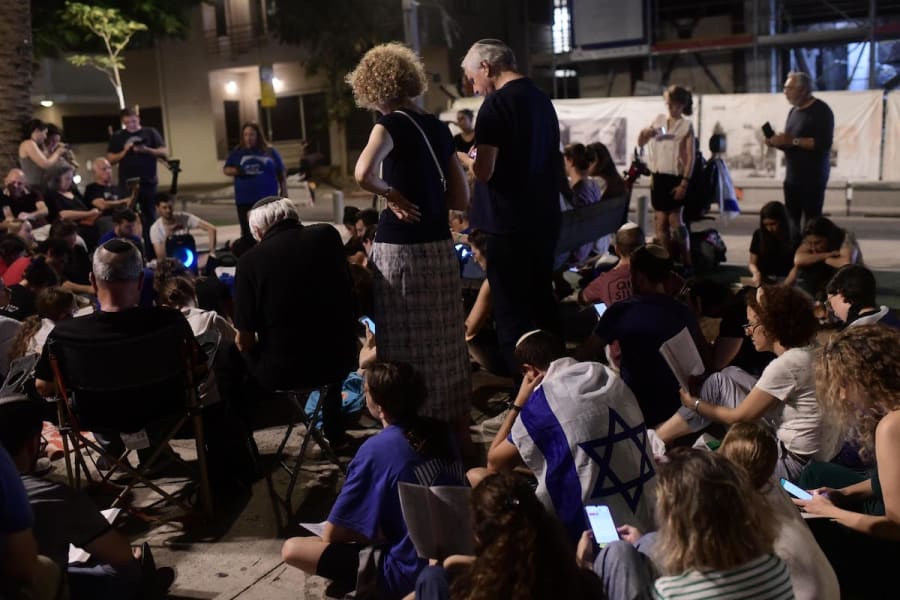Some secular Israelis fasting this Tisha B’Av, comparing destruction of Jewish temples and current judicial reform crisis
Observing traditions of mourning feels appropriate to many Israelis this year

With the nation of Israel observing the solemn commemoration of Tisha B’Av from Wednesday evening until Thursday evening – when Jews remember the destruction of the First and Second Temples – many secular Israelis are seeing a different reason to observe the traditional fast – the national judicial reforms crisis.
Traditionally, religious Jews fast from sundown to sundown in memory of the destruction of the two temples on the ninth day of the Hebrew month of Av.
This year, the passing of the Reasonableness Standard Bill on the sixth day of the month of Av has prompted even many secular Jews to adopt at least some of the traditions associated with the solemn day of Tisha B’Av.
The nontraditional fast this year was initiated by Mirik Snir, a children’s book author, through a WhatsApp group.
She posted an invitation to all Israelis to join her.
“We, a diverse group from all backgrounds, invite every Israeli – religious, secular, Right, Left, center – to join this fast on Tisha B'Av, using it as a shared protest against looming threats,” Snir wrote.
She is not the only Israeli seeing a connection between the current political crisis – involving deep divisions and internal discord among the Israeli population – and the situation that took place just before the destruction of the Second Temple.
According to rabbinic Jewish tradition, the city of Jerusalem fell to the Romans because of internal discord among the Jews in the city.
The protest leaders had already begun to speak of the judicial reforms as being a “destruction of the third Temple” before the reasonableness bill passed on Monday. But now Jewish leaders in Israel and the United States are more readily acknowledging the division over the legislation to the day of fasting.
“We are now a little over 24 hours away from Tisha B’Av, the day when we mark the loss of our sovereignty 2,000 years ago, due to internal fighting,” said Julie Platt, chair of the Jewish Federations of North America, during a briefing about the legislation.
On Wednesday night, after the start of Tisha B’Av, a group of protesters gathered outside the home of Likud Knesset Member Eli Dallal in Netanya and began to read from the Book of Lamentations, as is common during the commemorations.
Dallal, seeing the protesters, walked out of his home to join them, and received cheers from the group in return.
חבר הכנסת אלי דלל הצטרף עכשיו לקריאת המגילה מחוץ לביתו בנתניה.
— yayafink (יאיא פינק) (@yayafink) July 26, 2023
התקבל במחיאות כפיים על ידי המוחים בנתניה שחצי שנה מחכים שיצא אליהם. pic.twitter.com/ZwrLu2IvIh
Following the assassination of Prime Minister Yitzhak Rabin in 1995, Tisha B’Av has become a day when many Israelis – secular and religious, left and right – engage in dialogue about Jewish unity.
Former U.S. Ambassador to Israel David Friedman drew a connection between the timing of Tisha B’Av and the judicial reform push.
“Given the striking parallels between Israel’s current internal rift and the infighting that caused the destruction of the Second Temple 2000 years ago, why would the Israeli Government proceed with its Judicial Reform bill on the eve of Tisha B’Av?” Friedman tweeted.
Religious Jews see a pattern of bad events in Jewish history connected to Tisha B'Av.
For example, the expulsion of the Jews from England in 1290 happened on or near the fasting day, while the expulsion of the Jews from Spain in 1492 was finished on Tisha B’Av.
In modern Israeli history, the disengagement plan of Ariel Sharon in 2005 was carried out on the eve of Tisha B’Av.

The All Israel News Staff is a team of journalists in Israel.













